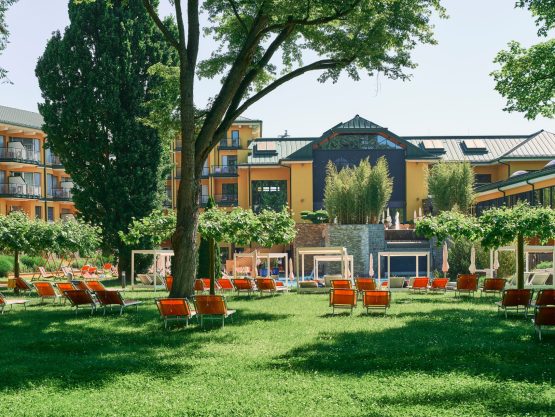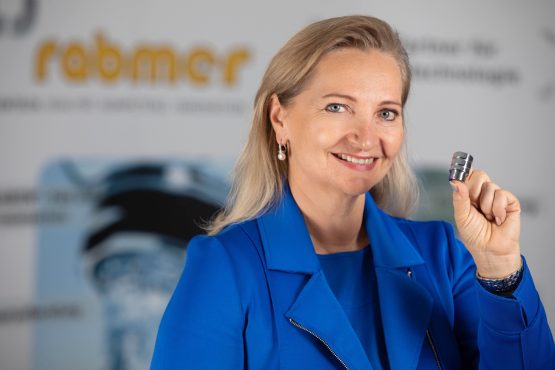Save energy costs and protect the climate
Rapidly rising energy prices are presenting the domestic hotel industry with an enormous challenge. In view of last summer's Europe-wide drought, the resource of water is increasingly taking center stage - not least driven by guests, who are increasingly choosing their accommodation based on climate protection aspects[1]. The Eurothermenresort Bad Schallerbach in Upper Austria demonstrates how both energy and water consumption can be reduced in the long term. 200 showers at the thermal spa were equipped with environmental technology from the Rabmer Group. The Ecoturbino system saves the resort around 9.1 million liters of water, 370,000 kWh of energy and 120 tonsof CO2 per year - without any loss of comfort for the guests.
Electricity and gas prices are skyrocketing, putting the local hotel industry in a precarious situation. The additional costs cannot be passed on to guests without risking a slump in bookings. Innovative solutions are needed. Especially for spas, which have been hit hard by the price increases. According to the Austrian Hotel Association, operators are expecting energy costs to rise by up to 400 percent and more.[2] A significant proportion of this is attributable to the showers in the accommodation, which consume above-average amounts of hot water. Eurothermen boss Patrick Hochhauser is also aware of this: "Anyone thinking about the hot water requirements of a thermal spa rarely has the showers in mind. But this is where huge amounts of water and energy are used, as our guests use the thermal baths extensively and shower correspondingly often."
There is no shortage of technical solutions to minimize consumption, but these often come at the expense of guest satisfaction. They were therefore not only looking for ways to protect the climate and save money, but also to continue to guarantee the highest level of comfort for guests, says Hochhauser: "We found what we were looking for practically in the immediate vicinity. The Rabmer Group from Altenberg near Linz upgraded our showers with the Ecoturbino system back in 2017. The guests appreciate our commitment to climate protection - and thanks to the Ecoturbinos, they don't even notice that they use almost half less water when showering."
Saving nine million liters of water - without any loss of comfort
At the Eurothermenresort Bad Schallerbach, a total of 200 showers in the hotel and thermal spa have been equipped with the Ecoturbino system. Every year, the spa saves around 9.1 million liters of water, 370,000 kWh of energy and 120 tonsof CO2. While many hotels used the forced break due to the pandemic to make their showers climate-friendly, to take account of rising prices and the newly awakened environmental awareness of their clientele, the Eurothermenresort already opted for innovative environmental technology from Rabmer five years ago and took on a pioneering role in this regard.
"The extent to which the Ecoturbino reduces water consumption, energy consumption and operating costs in a specific case can be easily determined using our savings calculator," explains Ulrike Rabmer-Koller, Managing Director of the Rabmer Group. "For hotels, factors such as the existing water pressure and the shower heads used are crucial. We therefore offer free measurements and test runs so that hoteliers can see the benefits of our technology for themselves."
Tried, tested and certified
The TÜV-certified Ecoturbino, which has been awarded the Austrian Ecolabel, is installed directly in the shower as a connecting piece between the tap and the shower hose. "The Ecoturbino reduces the water flow by around 40 percent, mixes it with air and creates a strong turbulence. This massively increases the flow rate while maintaining full showering comfort. In addition to reducing water consumption, hotels also reduce their operating costs enormously - this is particularly important in view of the high energy costs and theCO2 pricing that came into force in October," says Rabmer-Koller.
However, the use of climate-friendly environmental technology also pays off on another level. Tourists are increasingly looking at their ecological footprint when choosing their accommodation.[3] Hotels that sustainably reduce their operating costs can therefore create a new incentive for guests and expand their clientele.
[1] https://www.oehv.at/themen-recht/nachhaltigkeit/wie-wichtig-ist-nachhaltigkeit-fuer-unsere-gaeste/
[2] Preview around energy - ÖHV (oehv.at)
[3] https://www.oehv.at/themen-recht/nachhaltigkeit/wie-wichtig-ist-nachhaltigkeit-fuer-unsere-gaeste/


